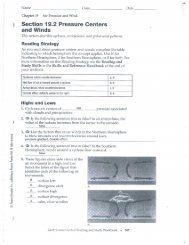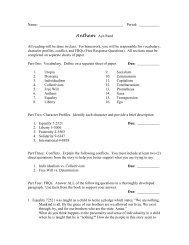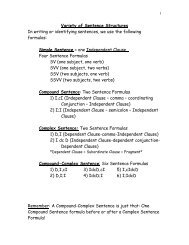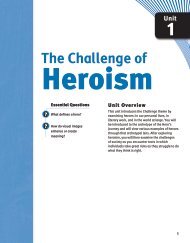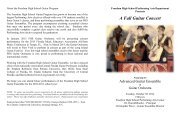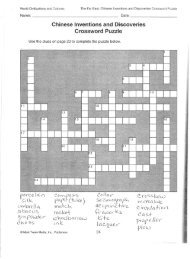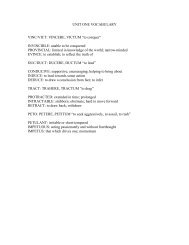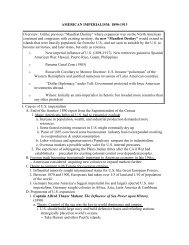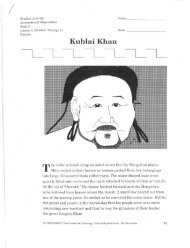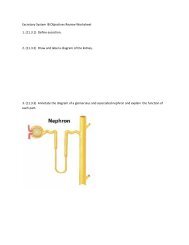Chapter 27 Empire and Expansion, 1890-1909 In the years after the ...
Chapter 27 Empire and Expansion, 1890-1909 In the years after the ...
Chapter 27 Empire and Expansion, 1890-1909 In the years after the ...
Create successful ePaper yourself
Turn your PDF publications into a flip-book with our unique Google optimized e-Paper software.
7. Taking on <strong>the</strong> Philippines made <strong>the</strong> US a Far Eastern power <strong>and</strong> created <strong>the</strong> problem of defending<br />
<strong>the</strong> isl<strong>and</strong>s <strong>and</strong> America wasn’t willing to do so.<br />
8. The war supported Mahan’s big-navyism, <strong>and</strong> American pride in <strong>the</strong> navy’s accomplishments<br />
created public support for more <strong>and</strong> better battleships.<br />
9. Elihu Root became secretary of war. He did reorganizations by establishing a general staff <strong>and</strong> a<br />
war college. These changes were helpful in WWI. Fighting toge<strong>the</strong>r helped heal <strong>the</strong> rift that still<br />
existed as a result of <strong>the</strong> division of <strong>the</strong> states in <strong>the</strong> Civil War.<br />
"Little Brown Bro<strong>the</strong>rs" in <strong>the</strong> Philippines<br />
1. Filipinos assumed that <strong>the</strong>y would be granted <strong>the</strong>ir freedom <strong>after</strong> <strong>the</strong> Spanish-American War, just<br />
like <strong>the</strong> Cubans. But, <strong>the</strong> U.S. excluded <strong>the</strong>m from peace negotiations from Spain <strong>and</strong> intended to<br />
stay in <strong>the</strong> Philippines indefinitely.<br />
2. On February 4, 1899, <strong>the</strong> Filipinos erupted in rebellion led by Emilio Aguinaldo.<br />
3. American soldiers as well as Filipino guerillas resorted to brutal fighting tactics <strong>and</strong> guerilla<br />
warfare. Despite it’s noble ideals, <strong>the</strong> U.S. resorted to torture such as <strong>the</strong> “water cure” for<br />
information out of prisoners; rivaled <strong>the</strong> atrocities of “Butcher” Weyler in Cuba.<br />
4. The backbone of <strong>the</strong> Filipino rebellion was broken in 1901 when American soldiers captured<br />
Emilio Aguinaldo.<br />
5. William H. Taft, who referred to <strong>the</strong> Filipinos to "little brown bro<strong>the</strong>rs," became governor of <strong>the</strong><br />
Philippines in 1901.<br />
6. President McKinley's plan of "benevolent assimilation" of <strong>the</strong> Filipinos was very slow <strong>and</strong><br />
involved improving roads, sanitation, <strong>and</strong> public health. The plan developed economic ties <strong>and</strong> set<br />
a school system with English as <strong>the</strong> 2 nd language. It was ill received by <strong>the</strong> Filipinos who<br />
preferred liberty over assimilation.<br />
7. The Filipinos finally received freedom July 4, 1946 (<strong>after</strong> WWII had ended).<br />
Hinging <strong>the</strong> Open Door in China<br />
1. Following China's defeat by Japan in 1894-1895, Russia <strong>and</strong> Germany moved into China.<br />
2. The American public was worried. Churches were concerned about <strong>the</strong>ir missionaries <strong>and</strong><br />
merchants feared that Chinese markets would be monopolized by Europeans. The public<br />
dem<strong>and</strong>ed that <strong>the</strong> U.S. government do something.<br />
3. Secretary of State John Hay dispatched to all <strong>the</strong> great powers a communication known as <strong>the</strong><br />
Open Door note. He urged <strong>the</strong> powers to announce that in <strong>the</strong>ir leaseholds or spheres of influence<br />
<strong>the</strong>y would respect certain Chinese rights <strong>and</strong> <strong>the</strong> ideal of fair competition.<br />
4. All <strong>the</strong> great powers eventually accepted it except for Russia (who wanted Manchuria).<br />
5. The Chinese did not care to be used by <strong>the</strong> West <strong>and</strong> in 1900, a super-patriotic group in China<br />
known as <strong>the</strong> "Boxers" killed hundreds of foreigners. A multinational rescue force came in <strong>and</strong><br />
stopped <strong>the</strong> Boxer rebellion.<br />
6. After <strong>the</strong> failed rebellion, <strong>the</strong> allied invaders assessed China an indemnity of $333 million, of<br />
which US was to get $24.5 million. U.S. didn’t need that much to pay for damages <strong>and</strong> expenses<br />
so it gave back $18 million to be used for education of Chinese students in <strong>the</strong> U.S. (an attempt to<br />
fur<strong>the</strong>r westernize Asia).<br />
7. Secretary Hay declared in 1900 that <strong>the</strong> Open Door would embrace <strong>the</strong> territorial integrity of<br />
China as well as its commercial integrity. This was eventually written into <strong>the</strong> Nine Powers<br />
Treaty of 1922 but was broken by Japan when <strong>the</strong>y conquered Manchuria in <strong>the</strong> ‘30s.<br />
Imperialism or Bryanism in 1900?<br />
1. President McKinley was <strong>the</strong> Republican presidential nominee for <strong>the</strong> election of 1900 because he<br />
had led <strong>the</strong> country through a war, acquired rich real estate, established <strong>the</strong> gold st<strong>and</strong>ard, <strong>and</strong><br />
brought prosperity to <strong>the</strong> nation.




